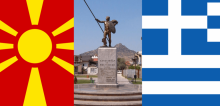Greeks
How the 3,000-year Greek presence on the Aegean shore came to an end
A very interesting analysis about the real fate of the Greeks of Asia Minor. What is important about it is that it has been written by a Turkish researcher and is being presented in the website of an organization -“Philos Project”- that is not affiliated with Greece, hence it could not be accused of been biased.
Greek Expats, save a young Greek and the country!
Here in Greece they are setting up the first post-redneck-communist regime under the pretext of the Memorandum (bailout program), in the EU, where poverty and terror reign as the law of the land.
- Read more about Greek Expats, save a young Greek and the country!
- Log in to post comments
Princeton's Hellenic Studies Center gets new Athens home
Dimitri Gondicas speaks passionately but modestly when discussing the new branch of Princeton University's Seeger Center for Hellenic Studies in Athens.
Gondicas has been at Princeton since the 1970s, first as a student of physics and then as a lecturer in Modern Greek, going on to become the director of the Seeger Center of Hellenic Studies in 2010.
The term “barbarian” was coined by the Ancient Greeks to describe foreign cultures that couldn’t speak Greek
The term “barbarian” is nowadays commonly used to describe people who are uncivilized, primitive or violent. It is also often used to refer to those who break the law or stand by obsolete and unconventional ideals.
8 in 10 Greeks believe in conspiracy theories, study shows
A large percentage of Greeks have a negative view of immigrants, according to a study conducted by research centre “DiaNOesis”. The findings 62.1% of those polled attributed the economic crisis to internal failings, with only 9.7% responding the faults lies outside Greece. 76% responded that the Greek society was at fault saying Greeks had become used to living beyond their means.
We ask if Alexander The Great was…”Macedonian”, Greek…or both
Right away this title is going to get a wide variety of reactions. Some people are already angry that anyone could say that Alexander wasn’t Greek or that he was only Macedonian, even saying that he was both could rile some people up. On the other hand, some people may have no idea how big an issue this has been in recent years and haven’t given a thought to the ethnicity of Alexander.
Greeks in Turkey on the verge of extinction
The current Greek population in Turkey is estimated at fewer than 2,000. But this population decline was not due to natural causes; the Greek community has become nearly extinct due to many state-sponsored attacks and pressure.
The largest attacks took place during the last years of the Ottoman Empire with pogroms and discrimination continuing until the present day.
- Read more about Greeks in Turkey on the verge of extinction
- Log in to post comments
Greek military observing Turkish research ship amid tensions
Greece's National Defense General Staff and the Hellenic Navy have been closely monitoring the presence of the Turkish research vessel Cesme off Andros following a spike in tensions with Turkey.
Canadian Senators campaign for recognition of Greek Pontiac Genocide (photos)
Two Canadian Senators are campaigning for the recognition of the Pontian Greek Genocide in the Canadian Senate.
Ancient Ionian Greeks first used GPS method to navigate
The ancient Ionian Greeks off the coast of Asia Minor from the city of Melitus were the first to use stars and their relationship with the earth’s surface to aid them in navigating the globe.










